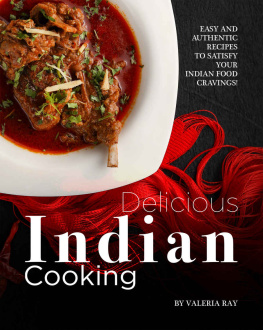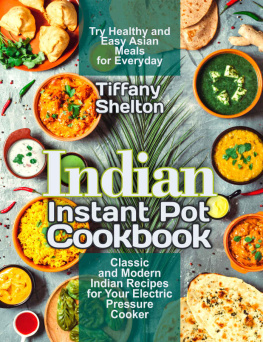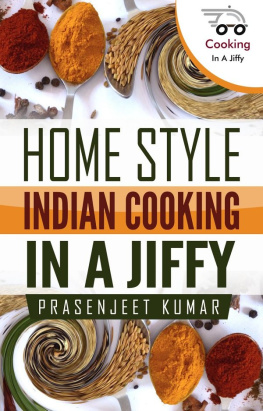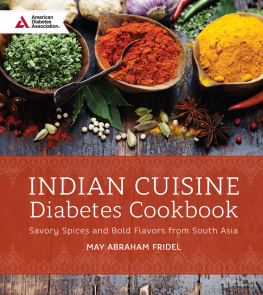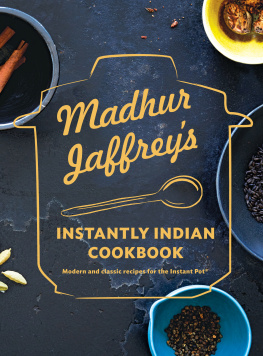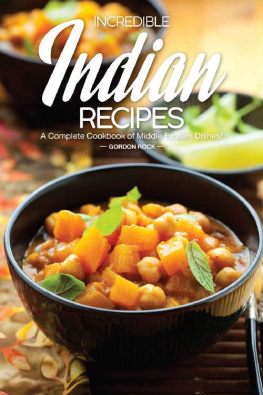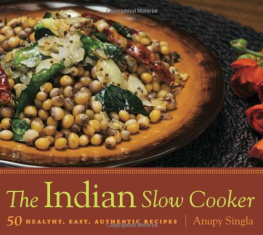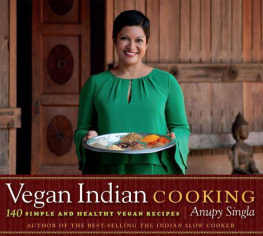Contents
Landmarks
Print Page List
Acknowledgments
The poetic and passionate writing of Maya Tiwari first inspired me to learn about Ayurveda, and I devoured her books, one after another. To her and Dr. Deepak Chopra, I owe a huge debt of gratitude. The brilliant works of Dr. Chopra gave me a glimpse into the esoteric world of health, his teachings becoming my moral compass. A lifetime of learning and cooking culminating in writing arrives on the heels of so many thoughtful and wonderful books I have enjoyed, and for this, I thank Charmaine Solomon in her great exploration of foods from Asia, Inder Singh Kalras definitive book on masterful Indian cooking, Tarla Dalals prolific recipe writing from Gujarati to Indian Italian, and Suneeta Vaswanis books on regional food. Marryam Reshiis defining book on spices taught me almost everything I need to know about spices. From writings by renowned historian Dr. K. T. Achaya, I learned about the history of foods in India. Lizzie Collinghams and Michael Krondls books on the history of the spice and sweet trade inspired me to dig deeper and deeper into colonial influences on the culture of India.
My community in Houston, from the staff at Pondicheri, almost all of whom we have turned into chai drinkers, to the customers from all walks of life who have wholeheartedly embraced my cooking and have come to make our restaurant their home away from home, I offer a heartfelt thank-you for your staunch support. To my recipe testers, Emmy and Lizzie Vest, Aila Peck, Sarah Gelb, Ben Jordan, and Sally Zikethank you for letting me into your kitchens. I am counting on you to become dosa masters! To my yoga teacher and dear friend, Ann Hyde, who has eaten at my restaurants almost every day for fifteen-plus years and has cheered me on with great gusto. I thank my friend, Neelam Singh, lawyer by day and Ayurvedic expert by night for carefully fact checking my writings on this vast subject.
The wind beneath my wings comes from my beloved children, Ajna and Virag, my ultimate unwavering fans, who became foodies by default and were open to lapping up whatever I felt like feeding them for years. They are the ones who counseled me on what to feed American kids for breakfastnot just parathas and dosas, but crepes and pancakes, please, Mom!
About the Author
Anita Jaisinghani is the chef-owner of Pondicheri Restaurant and Bake Lab + Shop in Houston, Texas. After obtaining a degree in microbiology and working in Canada for several years, Anita moved to Houston, Texas, where she pursued her passion for food by first selling locally made chutneys to Whole Food Market, then by going to work for Robert Del Grande at Caf Annie to learn the ins and outs of the restaurant business. In 2001, she opened Indika, an award-winning restaurant with a modern take on Indian food, in Houston, which she helmed until 2015. In 2011, wanting to take food to the street level by showcasing regional cooking of India, Anita opened Pondicheri, an all-day caf with inspiration from street and home cooking of India. With an industrial dcor of pungent colors and bright Indian textiles, Pondicheri has become an unofficial Houston landmark beloved by people of all generations. Pondicheri Bake Lab + Shop, a beautiful sun-filled annex located directly above the restaurant, opened in 2014. It sells a variety of baked goods, prepared masalas, other condiments, and unique textiles from India. It is a space where Anita and her team explore creative ideas and where Anita teaches cooking classes. Anita writes a weekly recipe column for the Houston Chronicle and runs the recipe website India1948.com. She is a perennial student of Ayurveda and yoga, with a deep passion for food and how it relates to every aspect of our mind, body, and spirit.
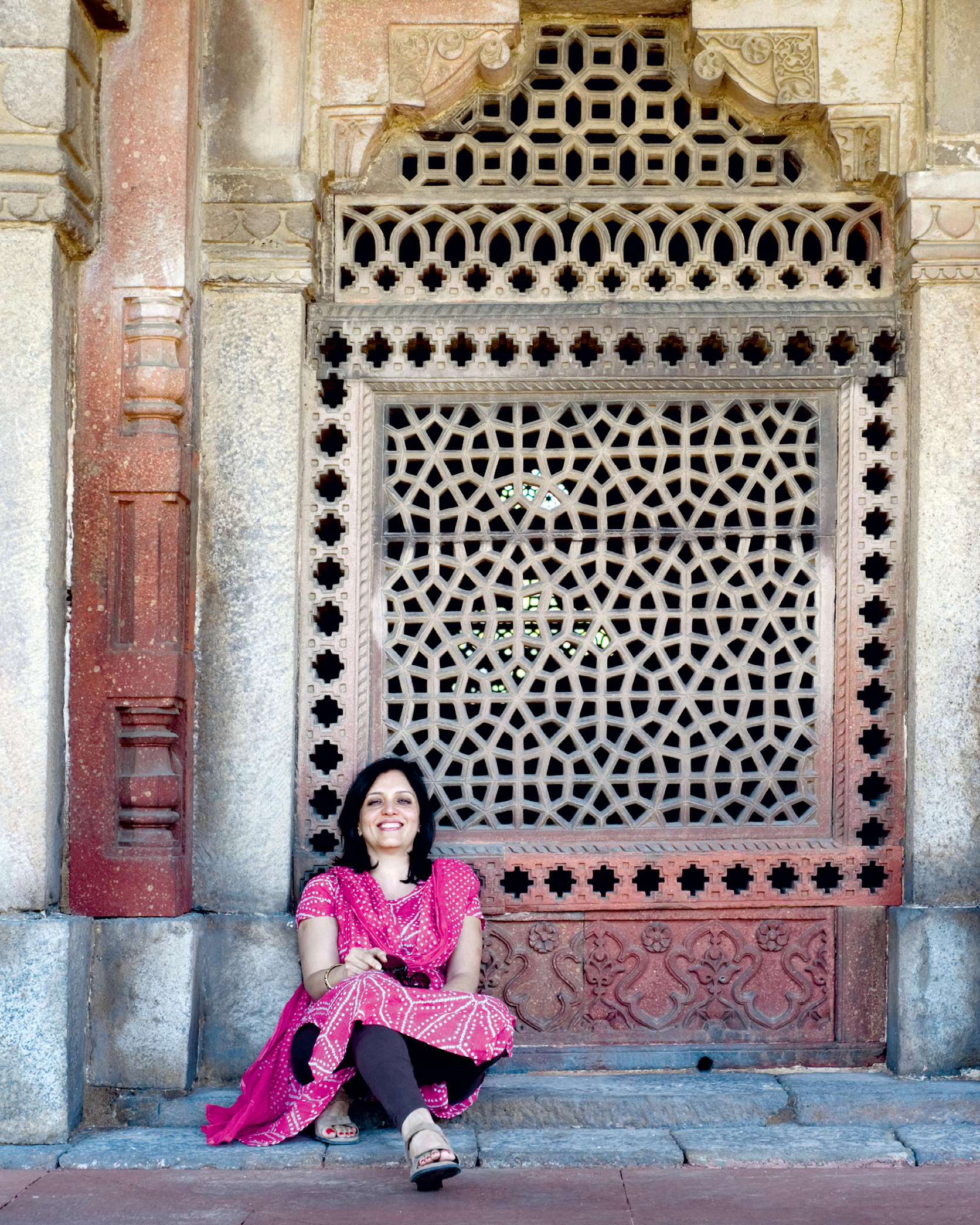
masalas
Masalas, the secret weapon of Indian kitchens to be deployed as needed, are quite simply a blend of spices and seasonings. One can be as simple as freshly grated coconut with sesame seeds, ginger, and sliced green chiles tucked away in the refrigerator to toss into a dal or a curry, or a blend of warm aromatic spices such as cardamom, cinnamon, and black pepper crushed in a mortar or pestle and used to make an instant chai masala. An Italian pesto can be a masala, and so can the Turkish blend of spices ras el hanout, as can the Spanish sofrito with peppers, onions, garlic, and olive oil. Fresh herbs, like cilantro and mint, can be pounded with ginger, serrano chiles, and olive oil to make green masala lathered on morning toast with fried eggs or smeared on a beautiful wild salmon fillet just before it goes in the oven. All four of the following masalas will keep for up to 3 months in an airtight container away from light.
chai masala
While chai masala will add a heady fragrance to your chai, it has so many other uses for cooking. Since it is left in chunks, it is best added at the start of cooking to infuse the flavors. Add 1 teaspoon to hot oil or ghee just before cooking a stew or curry for a fragrant finish. Or add a generous tablespoon or two to the water when making meat or vegetable stock. You can also make a tisane with it by just adding 1 teaspoon to a cup along with sliced ginger and a sprig of mint and pouring hot water over it.
MAKES CUP
4 large cinnamon sticks
2 tablespoons green cardamom pods
1 teaspoon black peppercorns
1 teaspoon whole cloves
3 or 4 mace flowers
Preheat the oven to 300F.
Combine all the spices in a small bowl. Spread them on a small baking sheet and toast in the oven for 3 to 4 minutes, until fragrant. Let cool and pulse in a coffee grinder until the spices are lightly crushed, not entirely ground.
coffee masala
Add coffee masala to ground coffee before brewing, but dont limit it to coffee. Rub it on a piece of chicken or steak before grilling or roasting or add to meat stews at the end of cooking for a fragrant finish.
MAKES CUP
4 cinnamon sticks
2 tablespoons black peppercorns
2 tablespoons green cardamom pods
2 star anise pods
teaspoon whole cloves
Preheat the oven to 300F.
Combine all the spices in a small bowl. Spread them on a baking sheet and toast in the oven for 3 to 4 minutes, until fragrant. Let cool and grind in a coffee grinder to a powder.
curry masala
Try to make small batches of this and use it up within 4 to 6 months or the flavors will dissipate. Use this in combination with garam masala (see below), which is best added at the end of cooking.
MAKES 3 CUPS
1 cup toasted ground cumin
cup dried ground turmeric
cup toasted crushed coriander seeds
cup freshly ground black pepper
cup red chile powder (add more if you like your food hot)
cup crushed fenugreek leaves
2 tablespoons toasted ground fennel seeds
Combine all the spices in an airtight container and store in a dark cool place.
garam masala
Garam masala, which literally translates to warm spice blend (meaning heating for the body) is the one masala that most Indian kitchens have tucked away in a cabinet. The recipes and proportions can vary wildly, but they will all possess a large amount of aromatic spices. Some will contain coriander and cumin. I prefer to leave it to aromatic spices, like the ones here, which adds a delicious heady finish to foods.
MAKES 1 CUP
cup green cardamom pods
6 large cinnamon sticks
5 star anise pods

![Anita Jaisinghani Masala: Recipes from India, the Land of Spices [A Cookbook]](/uploads/posts/book/320725/thumbs/anita-jaisinghani-masala-recipes-from-india-the.jpg)
